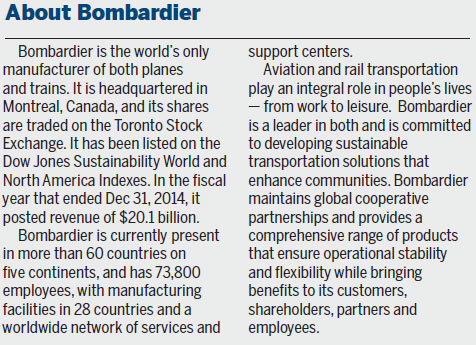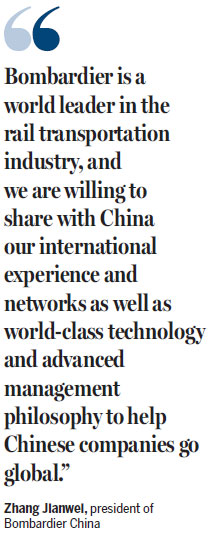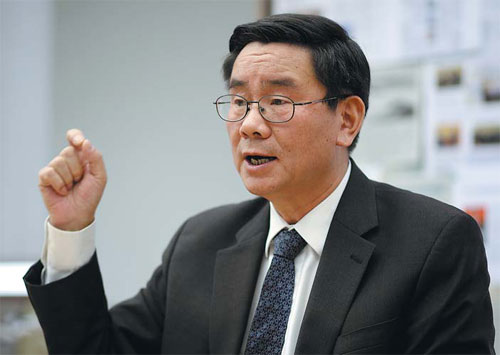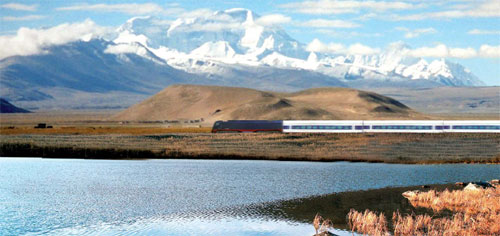Bombardier to bridge cooperation in China
President of Chinese division said company will help develop Belt and Road through joint ventures
In 1998, Bombardier, the world's leading train manufacturer, became the last foreign company to tap into China's rail transportation market. Since then, however, the company has overwhelmed its foreign peers in market share and has become one of the nation's most successful companies within the sector.
Despite the company's success, Zhang Jianwei, president of Bombardier China, said he can't afford to relax because of increasingly fierce competition in the Chinese market.
"China has the world's most competitive railway and urban mass transit market. It is unparalleled in terms of market share, potential, demand, product variety and the number of users. It has already established an integrated industrial manufacturing and service system, which has resulted in increasingly robust and complicated competition in the country," Zhang said.
"The Chinese market is large enough to accommodate a large number of international manufacturers, but this will not last very long. Some players will be forced out as the market and the competition develop."
Zhang recently spoke to China Daily about Bombardier's business development in the nation, his philosophy of cooperation and competition, and how the company will seize on opportunities brought by China's Belt and Road Initiative. The following are edited excerpts of the interview:
You have been working in Bombardier for 20 years. Did you expect to work in the company for such a long time when you first joined?
Honestly, at first I planned to work at Bombardier in Canada for a few months or a year to gain some practical experience in a multinational corporation because I was about to obtain my doctorate at that time and having such experiences would help promote my future research and teaching.
You were nominated as the president of Bombardier China in 2005 to develop businesses in the Chinese market. What was the most difficult time during the process?
Actually, there is no easy time during the whole process. The most difficult thing is not about commerce. I am not saying expanding our Chinese business is easy, but we can always find ways to solve these problems. The biggest challenge is to find a proper way of communicating between foreign companies amid different or even conflicting cultures, values, corporate management models and business practices. It is hard to let a multinational company with facilities in China adapt to both markets, because they have different rules and operation models, and I need to find a balance.
How do you think a company should react in times of crisis? Have you any edificatory ideas or experiences to share?
To borrow a line from Shakespeare's The Tempest, "What's past is prologue." I think current success does not mean all decisions made before were totally correct. But a current failure or crisis does not mean all the decisions made before were totally wrong. To sum up, a hero cannot be judged by victory or defeat. I saw an advertisement at a European airport during a business trip that said "Life is a curve, the most important is at which point of the curve you are on now", and I think that applies to a company. I am fully confident about the company's future development. I think companies or individuals should always keep calm in success or failure.
Bombardier China has witnessed rapid growth in recent years. How many employees does Bombardier China currently have? How do you manage the teams and how do you retain talent?
Bombardier China now has seven joint ventures and eight wholly owned subsidiaries, with about 6,000 employees. We are still hiring new people. I think one of the most important things in managing people is to let them see the potential and hope of the company and make them have a sense of belonging. Employees are the most important asset of a company. Being transparent is also important: The staff should share and understand the company's successes, challenges, difficulties and prospects. I have very demanding business requirements, but I never criticize people when they do not achieve planned results - I let them summarize their reasons to learn a lesson.
Bombardier China is considered one of the leading companies in rail transportation in the country. How did it get to this trusted position?
We depend on three aspects: advanced technologies, proven products and respecting commitments. We always think about what customers need most and what we could do for them. Initially, Bombardier China was not the preferred choice because the company was the last foreign company to enter China and was not recognized by Chinese customers. We don't hire any intermediate, and we directly communicate with customers to better know their needs and then introduce proper products. Reliable products and leading-edge technologies are also important. For example, we introduced successfully Bombardier's PRIMOVE technology for the Nanjing 2014 Youth Olympic Games. It is an advanced contactless and catenary-free power transfer technology enabling fast automatic wireless charging for electric trams.
How will Bombardier get involved in China's Belt and Road Initiative? Along with the implementation of the initiative, Chinese high-speed railway companies have started to go global. Will it affect Bombardier's overseas marketing performance?
Bombardier plans to join the development of China's Belt and Road Initiative through our Sino-foreign joint ventures. We are the only foreign company in China that has joint ventures to produce whole vehicles, including high-speed passenger trains, metro cars, monorail trains, and APMs - or automated people movers. In addition, Bombardier is a world leader in the rail transportation industry, and we are willing to share with China our international experience and networks as well as world-class technology and advanced management philosophy to help Chinese companies go global. The point is not how to compete with each other, but how to achieve a win-win result with the Chinese players in international markets.
Could you talk about the joint innovation and development that Bombardier China always promotes? How the future development model of China's rail transportation looks to you as a top entrepreneur in the industry?
What we do now is far beyond simple technology transfer. Cooperation between Bombardier and its Chinese partners focuses on the joint upgrade of existing technologies and the joint development of new technologies. For example, the Qinghai-Tibet railway, the world's highest railway, which is 5,000 meters above sea level, was developed by one of our joint ventures - Bombardier Sifang (Qingdao) Transportation Ltd. Also, we have commercialized many of our world-leading technologies in our joint ventures and will continue to do that, so we can move forward together. I think China's rail transportation business will undergo three stages: build joint ventures with foreign companies to learn technologies and experiences; its companies will begin to grow and control the Chinese markets; and Chinese and foreign companies will compete and cooperate in fully open markets, both in China and outside China. China is now at that second stage.
What is the current market situation of China's business jet industry? What are its prospects?
China does not have the world's largest business aircraft market now, but it has the largest potential, with the fastest annual growth rate. As China's economic situation changes, the aims of Chinese billionaires buying business jets are now also different, changing from considering the aircrafts a symbol of wealth and social status to a tool for improving efficiency. As the world's largest manufacturer of business planes, Bombardier has the most complete product portfolio to meet the needs of different users. We have the largest market share in China. To date, the company has delivered over 120 planes to Chinese consumers.
What are your plans and expectations for Bombardier China's future development?
My goal is to make Bombardier sustainably successful in China, which requires maintaining our competitiveness in China. I am not too concerned about what our competitors do, but I am paying more attention to whether Bombardier China is conforming to market trends. Only by closely following the market can we be invincible.
haonan@chinadaily.com.cn



|
Zhang Jianwei, president of Bombardier China, says the company will continue to develop in China despite growing competition in the train manufacturing market. Photos provided to China Daily |
|
High-altitude train coaches developed by Bombardier Sifang (Qingdao) Transportation Ltd are used on the Qinghai-Tibet Railway. |
(China Daily 12/05/2015 page12)










